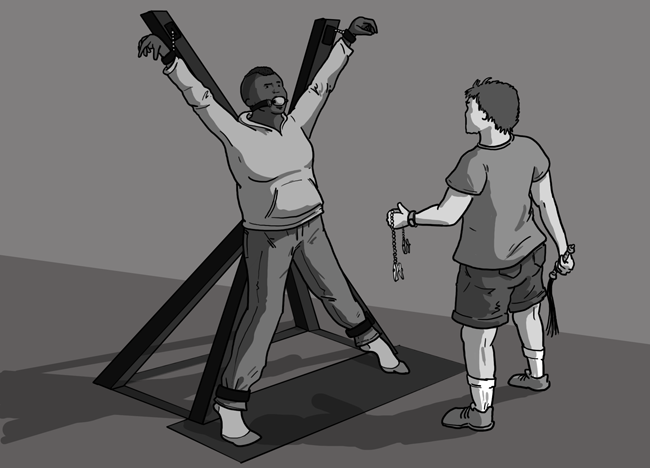Today’s guest blogger is the excellent Quenby, who can be found at QuenbyCreatives on Twitter or over on their excellent blog Quenby Creatives. I’m especially excited about their post today because it takes a BDSM topic that is usually presented in a very simplistic manner and explores it in a lot more depth: safe words. Do you use safe words? How conscious is that choice? And are they serving the purpose that you need them to? Take it away Quenby…
Safe words aren’t magic
Read any introduction to BDSM and you’ll come across the idea of a safe word. The magic phrase which protects you from getting hurt or taken advantage of. The thing that separates the safe sane and consensual from abuse. It’s a lovely idea, the only problem is that it doesn’t work like that.
A safe word is one communication tool among many, and by placing too much focus on it you risk overconfidence and overlooking other means of communication in kink. Discussions of limits, risk profiles, and warning signs are all way more important when negotiating a scene than picking a safe word. Yet it is always safe words which seem to take centre stage when BDSM gets discussed.
So why can’t you always rely on safe words? Here’s a non-comprehensive list of answers to that question:
- You can’t speak – I know I sometimes get too overwhelmed or spacey to verbalise, that’s when you need non-verbal communication.
- It’s easier to say yes – In psychology there is a wealth of evidence that the framing of a question can change the answer. A safe word frames kink as an opt-out rather than an opt-in, meaning that if you say nothing the default is to continue the scene. This kind of question structure tends to give a higher positive response rate, meaning that people are more likely to continue a scene than they would be if you asked “would you like to stop?” Or “what would you like?”
- You freeze – Related to the previous point, for people living with trauma it can be extraordinarily hard to speak up when they aren’t comfortable with something. To minimise this risk you want to make it as easy as possible to pause or stop a kink scene.
- There are other signs – Body language is imprecise and varies a lot from person to person, you absolutely shouldn’t use it on its own. But it does work very fast. If you know your partner’s breathing pattern, stance, and movements will enough then changes in these patterns can give advanced notice. It can warn you something is wrong and prompt you to check in before words have a chance to form. And reacting quickly, catching a problem before it’s fully developed, that can make all the difference.
- You can’t remember – Using a safe word takes practice, it needs to be so deeply engrained that when you’re overwhelmed and can’t take any more you can still remember it and reach for it. If you don’t have that trained instinct playing with a safe word can be more dangerous playing without one.
Perhaps my biggest issue with the focus on safe words though is that they undermine one of the main rules of consent. NO MEANS NO. Nine times out of ten, saying ‘no’ should be all that’s needed to stop a scene. If you’re engaged in consensual non-consent or related roleplay then this might no longer be the case. But this should be treated as the exception, not the rule. Unless you have explicitly negotiated otherwise, NO MEANS NO, and a safe word is redundant.
So why is there such a focus on safe words? I think it’s because they offer an easy solution, a promise that good kink can be ensured with one simple tool. Ultimately healthy relationships (sexual, kinky, and platonic alike) come about from good communication. They come from being honest and vulnerable about what you like, what you don’t like, what you expect from one another. All of these things take work, but there’s no substitute for good communication.
I’m not going to say don’t use a safe word. They work really well for some people and in the right circumstances they can be a valuable communication tool. But for the love of all that is hole-y, please don’t make it your only one. Because safe words aren’t magic, and we need to stop pretending they are.

1 Comment
I’ve been looking for something to read at night.
Glad I found you!